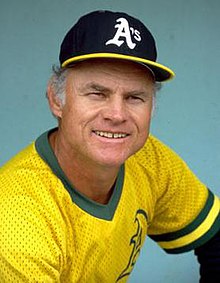Steve Boros
| Steve Boros | |||
|---|---|---|---|

Boros with Oakland, c. 1983
|
|||
| Third baseman | |||
|
Born: September 3, 1936 Flint, Michigan |
|||
|
Died: December 29, 2010 (aged 74) DeLand, Florida |
|||
|
|||
| MLB debut | |||
| June 19, 1957, for the Detroit Tigers | |||
| Last MLB appearance | |||
| May 8, 1965, for the Cincinnati Reds | |||
| MLB statistics | |||
| Batting average | .245 | ||
| Home runs | 26 | ||
| Runs batted in | 149 | ||
| Teams | |||
|
As player
As manager
|
|||
As player
As manager
Stephen Boros, Jr. (September 3, 1936 – December 29, 2010) was an American baseball infielder, coach, manager, scout, and administrator. Best known for his scientific approach to the sport and his use of computers, Boros' baseball career spanned almost 50 years from his debut as a player for the University of Michigan in 1956 to his retirement in 2004 as an executive with the Detroit Tigers.
After playing college baseball for the University of Michigan from 1956 to 1957, Boros signed as a bonus baby with the Detroit Tigers in June 1957. He remained in the Tigers organization from 1957 to 1962. He was the most valuable player in the American Association in 1960 and had his best major league season in 1961 despite missing six weeks with a broken collar bone. During his tenure with the Tigers, Boros was the subject of widespread coverage of his tendency to read history books and fine literature and of his aspiration to become a professor of literature. He finished his major league playing career with the Chicago Cubs and Cincinnati Reds from 1963 to 1965. In 1964, he set a Reds club record with 50 consecutive errorless games at third base. He played a total of 13 years in professional baseball, including stints with several minor league clubs from 1957 to 1969.
In 1970, Boros began a lengthy career as a baseball manager, scout, and coach. While working in the Kansas City Royals farm system, he developed a reputation as a leading advocate of the stolen base. Under his leadership, the San Jose Bees set a modern minor league record with 372 stolen bases in one year. As the first base coach of the Kansas City Royals from 1976 to 1979, he became known for his scientific approach to the stolen base, taking measurements with a stopwatch and maintaining a book on every pitcher and catcher in the American League. The Royals led the league in stolen bases in both 1978 and 1979. As the Montreal Expos first base coach, he was credited with helping Tim Raines lead the National League in stolen bases in both 1981 and 1982.
...
Wikipedia
